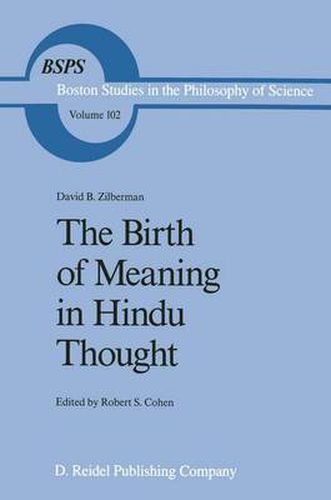Readings Newsletter
Become a Readings Member to make your shopping experience even easier.
Sign in or sign up for free!
You’re not far away from qualifying for FREE standard shipping within Australia
You’ve qualified for FREE standard shipping within Australia
The cart is loading…






This title is printed to order. This book may have been self-published. If so, we cannot guarantee the quality of the content. In the main most books will have gone through the editing process however some may not. We therefore suggest that you be aware of this before ordering this book. If in doubt check either the author or publisher’s details as we are unable to accept any returns unless they are faulty. Please contact us if you have any questions.
In his letter to B. K. Matilal, dated February 20, 1977, the author of this book wrote about his work on Advaita-Vedanta:
… It was not to present Advaita in the light of current problems of the logic of scientific discovery and modern philosophy of language … but just the contrary. I do not believe that any ‘logic without metaphysics’ or ‘philosophy of language without thinking’ is possible. This passage alone may serve as the clue to Zilberman’s understanding and mode of explaining that specific and highly original approach to (not ‘of’!) philosophy that he himself nicknamed modal. Four points would seem to me to be most essential here. First, a philosophy cannot have ‘anything un-thinking’ as its object of investigation. Language, to Zilberman, is not a phenomenon of con sciousness but a spontaneously working natural mechanism (like, for instance, ‘mind’ to some Buddhist philosophers). It may, of course, be come used for and by consciousness; consciousness may see itself, so to speak, in language, but only secondarily, only as in one of its modifica tions, derivations or modalities. That is why to Zilberman linguistic- as to Kant psychology - cannot and must not figure as the primary ground for any philosophical investigation.
$9.00 standard shipping within Australia
FREE standard shipping within Australia for orders over $100.00
Express & International shipping calculated at checkout
This title is printed to order. This book may have been self-published. If so, we cannot guarantee the quality of the content. In the main most books will have gone through the editing process however some may not. We therefore suggest that you be aware of this before ordering this book. If in doubt check either the author or publisher’s details as we are unable to accept any returns unless they are faulty. Please contact us if you have any questions.
In his letter to B. K. Matilal, dated February 20, 1977, the author of this book wrote about his work on Advaita-Vedanta:
… It was not to present Advaita in the light of current problems of the logic of scientific discovery and modern philosophy of language … but just the contrary. I do not believe that any ‘logic without metaphysics’ or ‘philosophy of language without thinking’ is possible. This passage alone may serve as the clue to Zilberman’s understanding and mode of explaining that specific and highly original approach to (not ‘of’!) philosophy that he himself nicknamed modal. Four points would seem to me to be most essential here. First, a philosophy cannot have ‘anything un-thinking’ as its object of investigation. Language, to Zilberman, is not a phenomenon of con sciousness but a spontaneously working natural mechanism (like, for instance, ‘mind’ to some Buddhist philosophers). It may, of course, be come used for and by consciousness; consciousness may see itself, so to speak, in language, but only secondarily, only as in one of its modifica tions, derivations or modalities. That is why to Zilberman linguistic- as to Kant psychology - cannot and must not figure as the primary ground for any philosophical investigation.